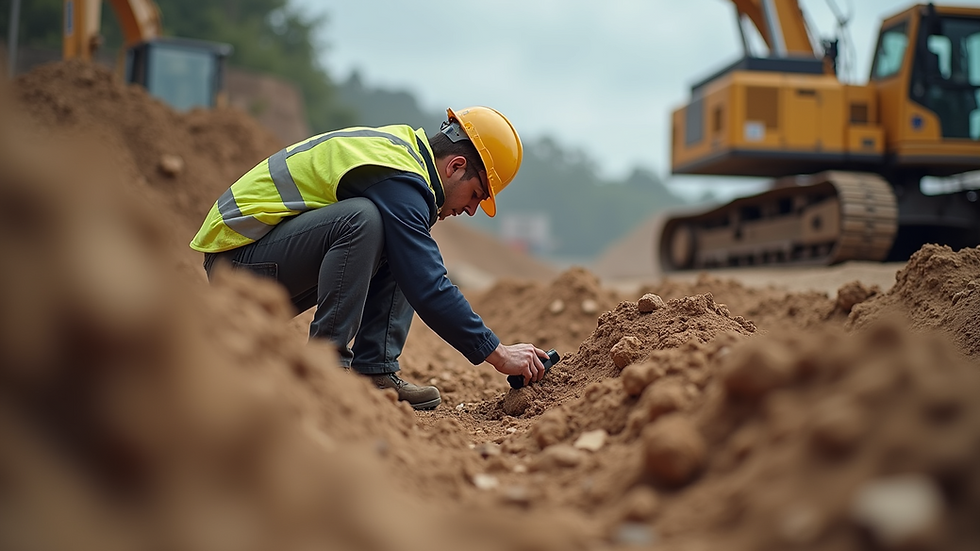Expert Geotechnical Engineering Services for Infrastructure Development
- Karina Salatiel
- 27 de jul.
- 5 min de leitura
In the world of infrastructure development, the ground beneath our feet plays a crucial role. Geotechnical engineering is the backbone of any construction project, ensuring that structures are built on solid ground. This field combines principles of soil mechanics and rock mechanics to assess the physical and chemical properties of soil and rock. Understanding these properties is essential for the safety and longevity of buildings, roads, bridges, and other infrastructure.
In this blog post, we will explore the importance of expert geotechnical engineering services. We will discuss how these services contribute to successful infrastructure projects, the processes involved, and the benefits of hiring experienced professionals.
What is Geotechnical Engineering?
Geotechnical engineering is a branch of civil engineering that focuses on the behavior of earth materials. It involves studying soil and rock to determine their physical and chemical properties. This information is vital for designing foundations, retaining walls, and other structures that interact with the ground.
Geotechnical engineers conduct various tests to analyze soil and rock samples. These tests help determine the load-bearing capacity of the ground, the potential for soil erosion, and the risk of landslides. By understanding these factors, engineers can design safe and effective structures.
The Role of Geotechnical Engineering in Infrastructure Development
Geotechnical engineering plays a significant role in infrastructure development. Here are some key areas where it is essential:
Site Investigation
Before any construction begins, a thorough site investigation is necessary. This process involves collecting soil and rock samples from the site. Engineers analyze these samples to understand the ground conditions.
A comprehensive site investigation helps identify potential issues, such as weak soil or high groundwater levels. By addressing these concerns early, engineers can design structures that are safe and stable.
Foundation Design
The foundation is the most critical part of any structure. It transfers the weight of the building to the ground. Geotechnical engineers design foundations based on the soil's load-bearing capacity.
There are various types of foundations, including shallow and deep foundations. The choice depends on the soil conditions and the structure's weight. For example, a deep foundation may be necessary in areas with weak soil to ensure stability.
Slope Stability Analysis
In areas with hills or slopes, slope stability is a major concern. Geotechnical engineers assess the risk of landslides and other slope failures. They analyze factors such as soil composition, moisture content, and vegetation.
By conducting slope stability analysis, engineers can design retaining walls or drainage systems to prevent failures. This proactive approach helps protect both the infrastructure and the surrounding environment.
Ground Improvement Techniques
Sometimes, the existing soil conditions are not suitable for construction. In such cases, geotechnical engineers may recommend ground improvement techniques. These methods enhance the soil's properties, making it more stable and suitable for building.
Common ground improvement techniques include soil compaction, grouting, and the use of geosynthetics. Each method has its advantages and is chosen based on the specific site conditions.
Benefits of Hiring Expert Geotechnical Engineers
Investing in expert geotechnical engineering services offers numerous benefits for infrastructure development. Here are some key advantages:
Enhanced Safety
Safety is the top priority in any construction project. Expert geotechnical engineers assess the ground conditions to identify potential hazards. By addressing these issues early, they help ensure the safety of the structure and its occupants.
Cost Savings
While hiring geotechnical engineers may seem like an added expense, it can save money in the long run. By identifying potential issues early, engineers can help avoid costly delays and repairs.
Additionally, proper foundation design and ground improvement techniques can reduce the risk of structural failures, which can be extremely expensive to fix.
Improved Project Efficiency
Expert geotechnical engineers streamline the construction process. Their thorough site investigations and analyses provide valuable information that helps guide the design and construction phases.
With a clear understanding of the ground conditions, construction teams can work more efficiently, reducing the time it takes to complete the project.
Compliance with Regulations
Infrastructure projects must comply with various regulations and standards. Expert geotechnical engineers are familiar with these requirements and ensure that the project meets all necessary guidelines.
This compliance helps avoid legal issues and ensures that the project is safe and reliable.
Case Studies: Successful Infrastructure Projects
To illustrate the importance of geotechnical engineering, let’s look at a few successful infrastructure projects that benefited from expert services.
The Golden Gate Bridge
The Golden Gate Bridge in San Francisco is an iconic structure. Before construction began, geotechnical engineers conducted extensive site investigations. They analyzed the soil and rock conditions to design a foundation that could withstand the forces of nature.
The bridge's towers are anchored deep into the bedrock, providing stability against strong winds and earthquakes. This careful planning has allowed the bridge to stand for over 80 years.
The Big Dig
The Big Dig in Boston was one of the largest urban construction projects in the United States. Geotechnical engineers played a crucial role in this project, which involved rerouting highways and constructing tunnels.
Engineers conducted detailed site investigations to assess the soil conditions. They used ground improvement techniques to stabilize the soil and prevent issues during construction. The project was completed successfully, transforming the city’s infrastructure.
The Future of Geotechnical Engineering
As infrastructure needs continue to grow, the role of geotechnical engineering will become even more critical. Emerging technologies, such as geophysical methods and advanced modeling software, are enhancing the capabilities of geotechnical engineers.
These advancements allow for more accurate assessments of ground conditions and improved design processes. As a result, infrastructure projects can be completed more efficiently and safely.
Choosing the Right Geotechnical Engineering Firm
When selecting a geotechnical engineering firm, it is essential to consider several factors:
Experience and Expertise
Look for a firm with a proven track record in geotechnical engineering. Experienced engineers will have the knowledge and skills to handle various projects and challenges.
Range of Services
Choose a firm that offers a comprehensive range of services. This includes site investigations, foundation design, slope stability analysis, and ground improvement techniques. A full-service firm can address all your geotechnical needs.
Reputation and Reviews
Research the firm's reputation in the industry. Read reviews and testimonials from previous clients to gauge their level of satisfaction. A reputable firm will have positive feedback and a strong portfolio of successful projects.
Communication and Collaboration
Effective communication is vital for a successful project. Choose a firm that values collaboration and keeps you informed throughout the process. This ensures that your needs and concerns are addressed promptly.
Final Thoughts
Geotechnical engineering is a vital component of infrastructure development. By understanding the ground conditions, expert engineers help ensure the safety and stability of structures.
Investing in professional geotechnical engineering services can lead to safer, more efficient, and cost-effective projects. As infrastructure needs continue to grow, the importance of this field will only increase.
Whether you are planning a new building, road, or bridge, consider the value of expert geotechnical engineering services. They are the foundation of successful infrastructure development.




Commenti